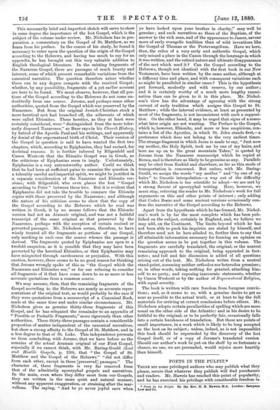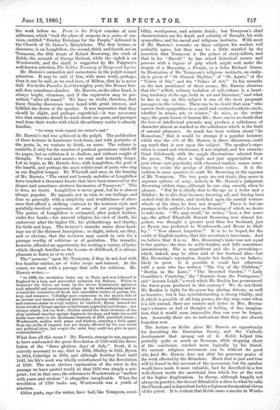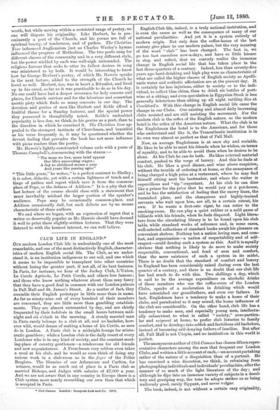POETS IN THE PULPIT.*
THERE are some privileged authors who may publish what they please, secure that whatever they publish will find purchasers and readers. Mr. Haweis has reached this point of popularity, and he has exercised his privilege with considerable freedom in • Poets in the Ptdpit. By the Bey. H. B. Haweb,bLA. London: Bampon Low and Co.
the work before us. Poets in the Pulpit consists of nine addresses, which "took the place of sermons in a series of ser- vices, entitled "Sunday Evenings for the People," delivered in the Church of St. James's, Marylebone. The first lecture, or discourse, is on Longfellow, the second, third, and fourth are on 'Tennyson, the fifth treats of Robert Browning, the sixth of
Keble, the seventh of George Herbert, while the eighth is on Wordsworth, and the ninth is suggested by Mr. Palgrave's well-known selection, The Golden Treasury of Songs and Lyrics.
Mr. Haweis's animation and earnestness in the pulpit compel attention. It may be said of him, with more truth, perhaps, than it can be said, as we read here, of Milton, that he is never dull. For in the Paradise Lost the mighty poet, like Homer him- self, does sometimes slumber. Mr. Haweis, on the other hand, is always bright, vivacious, and if the expression may be per- mitted, "alive all round." We have no doubt, therefore, that these Sunday discourses were heard with great interest, and fulfilled the desire of the speaker. It was imperative that they should be slight, and perhaps superficial,—it was necessary also that remarks should be made about our poets, and passages read from their works with which the ordinary reader is already familiar.
"In every work regard the writer's end."
Mr. Haweis's end was achieved in the pulpit. The publication of these lectures in handsome book-form, and with portraits of the poets, is, we venture to think, an error. The volume is
readable, if only for the -number of poetical quotations which fill its pages, but as criticism it is shallow, and without weight of thought. We read and assent; we read and instantly forget. Let us begin, as Mr. Haweis does, with Lengfellow, the poet of the hearth, and perhaps the most widely-read of poets who sing in our English tongue. Dr. Whewell said once, in the hearing
of Mr. Haweis, "The sweet and homely melodies of Longfellow have touched a thousand hearts that have been unmoved by the deeper and sometimes abstruse harmonies of Tennyson." This is true, no doubt. Longfellow is never great, but he is almost always popular. He appeals, not in vain, to our feelings, and does so generally with a simplicity and truthfulness of utter- ance that afford a striking contrast to the tortuous style and painfully-involved expression of some of our younger poets.
'The genius of Longfellow is estimated, after pulpit fashion, under five heads,—his natural religion, his view of death, his endeavour after the higher life, his philanthropy and charity, his faith and hope. The lecturer's remarks under these head- ings are of the thinnest description ; so slight, indeed, are they, and so obvious, that the reviewer may search in vain for a passage worthy of criticism or of quotation. The remarks, however, afforded an opportunity for reciting a variety of lyrics which, though familiar as the lessons of childhood, it is always pleasant to listen to or to read.
The " sermons " upon Mr. Tennyson, if they do not deal with less familiar matter, are of wider scope and interest. At the outset, we meet with a passage that calls for criticism. Mr. Haweis writes :—
" In 1830, the revolution broke out in Paris, and was followed in England by a long and successful agitation for Reform. Whilst in literature the forces set loose by the severe Continental agitation took splendid and spontaneous shape in the wide-embracing and in- exhaustible excursions of Scott into untrodden realms of poetry, his- tory, and romance ; Coleridge gave expression to the mystic side of an intense and earnest religious philosophy ; Southey added clearness and common-sense to every subject he touched ; Byron uttered the fierce revolt of hisage against social fetters, hypocrisy, and shams,—not always wisely, but too well ; Shelley seized the finer elements of the deep spiritual reaction against dogmatic theology, and bade the world bathe once more in the Arethnsan fountain of wild, unsullied nature ; Wordsworth, mellow with years and wisdom, standing a little apart from the strife of tongues, was yet deeply affected by the new social and political ideas, but sought the calm they could not give in quiet -contemplation."
What does all this mean ? Mr. Haweis, strange to say, appears to have confounded the great Revolution of 1789 with the Revo- lution of the "three glorious days of July." Scott, it is searcely necessary to say, died in 1832, Shelley in 1822, Byron in 1824, Coleridge in 1834, and although Southey lived until 1843, his life's work was wholly uninfluenced by the Revolution of 1830. The most obvious explanation of the error in the passage we have quoted would be that 1830 was simply a mis- print; but in that case, the reference to Wordsworth as "mellow with years and wisdom " is altogether inexplicable. When the revolution of 1789 broke out, Wordsworth was a youth of nineteen.
Other poets, says the writer, have had, like Tennyson, sensi- bility, word-power, and artistic finish ; but Tennyson's chief characteristics are his depth and sobriety of thought, his wide sympathies, and his moral and religious instincts. With most of Mr. Haweis's remarks on these subjects his readers will probably agree, but they may be a little startled by the assertion that Tennyson is the prince of story-tellers, and that in his " Harold " he has seized historical scenes and persons with a vigour of grip which might well make the despair of a Macaulay, a Froude, or a John Richard Green. In illustration of Mr. Tennyson's religious instincts, an analy- sis is given of "St. Simeon Stylites," of "St. Agnes," of the "Vision of Sin," and the "Palace of Art." In his remarks on the last mentioned of these poems, Mr. Haweis observes that the " selfish, solitary isolation of self-culture is a beset- ting tendency of the age, both in art and literature," and what he has to say on this subject is one of the most pregnant passages in the volume. There can be no doubt that men " who narrow their sympathies to a small and confined vesthetic circle, whether in music, art, or science," do miss, as the writer says, the great lesson of human life; there can be no doubt that the love of intellectual pursuits may produce a selfishness of character almost as marked as the selfishness which is the fruit of sensual pleasures. So much has been written about "In Memoriam," that it would be strange if a popular lecturer, which was the rtlle of Mr. Haweis in these discourses, could say much that is new upon the subject. The speaker's expo- sition is sound and wholesome, if not original, and his remarks blend felicitously with the ample illustrations selected from the poem. They show a high and just appreciation of a poet whose vast popularity with educated readers seems some- times to excite the grudge of dilettante critics. It is the fashion in some quarters to exalt Mr. Browning at the expense of Mr. Tennyson. The two poets are not rivals, they move in
separate spheres of song ; indeed, in Mr. Haweis's judgment, Browning seldom sings, although he can sing sweetly when he pleases. "But lie is chiefly dear to the age as a feeler and a thinker ; he is also dear because, knowing all, and having been racked with its doubts, and stretched upon the mental torture- wheels of his time, he does not despair." There is but one passage in the author's lecture on Browning of which we desire to take note. "We may recall," he writes, "how, a few years ago, the gifted Elizabeth Barrett Browning, now almost for- gotten, was thought a greater poet than her husband, just as Byron was preferred to Wordsworth, and Moore to Shel- ley." "Now almost forgotten !" It is to be hoped, for the credit of English readers, that this assertion is inaccurate. And we believe that it is so. Mrs. Browning's taste was not equal to her genius ; she rises to noble heights, and falls sometimes ignominiously. She is magnificent and she is provoking— which, indeed, may be often said of her husband also—but Mrs. Browning's reputation, despite her faults, is, we believe, likely to grow. Is it possible it could faro otherwise with a poet who has written "The Cry of the Children," "Bertha in the Lane," "The Deserted Garden," "Lady Geraldine's Courtship," the "Sonnets from the Portuguese," and "Aurora Leigh," a work which Mr. Ruskin has pronounced the finest poem produced in this century ? We do not think Mr. Ruskin is right, for the poem has glaring defects, as well as beauties ; but it has, notwithstanding, a strong vitality, and if, which is possible of all long poems, the day may come when it is left unread, there are sonnets and lyrics in Mrs. Brown- ing's volumes so full of thought, of feeling, of fine imagina- tion, that it would seem impossible they can ever be forgot- ten. Assuredly there are no indications that they are almost forgotten now.
The lecture on Keble gives Mr. Haweis an opportunity for describing the Tractarian theory, and the Catholic development that sprang out of it. Keble helped this probably quite as much as Newman, while stopping short of the conclusion reached more logically by his friend. No earnest religious movement can be without its good side, land Mr. Haweis does not stint his generous praise of the work effected by the Ritualists. Much that is just and true will be found in this account of the movement, but the speaker would have made it more valuable, had he described in a few well-chosen words the sacerdotal idea which lies at the root of the higher Anglicanism. In theory, although happily not always in practice, the devout Ritualist is a slave to what he calls the Church, and is dependent for his religion on the mystical virtue of the priest. It is evident that Keble owns a master in Words-
worth, but while moving within a restricted range of poetry, no one will dispute his originality. Like Herbert, he is pre- eminently a poet of the Church, and his poems are full of spiritual beauty, of tenderness, and of pathos. The Christian year influenced Anglicanism just as Charles Wesley's hymns influenced the progress of Methodism. The two poets sang for different classes of the community and in a very, different style, but the power wielded by each was well-nigh unbounded. The religious fervour that seeks to utter its fullest desires in song was ministered to by both. It would be interesting to know how far George Herbert's poetry, of which Mr. Haweis speaks in the next lecture, added to the strength of the Church he loved so well. Herbert, too, was in heart a Ritualist, and lived up to his creed, so far as it was practicable to do so in his day. No one could have had a deeper reverence for holy seasons and places, for Church services and for the laborious and somewhat ascetic piety which finds so many converts in our day. The devotion and genius of men like Herbert and Keble afford a fruitful theme for a Sunday lecturer, and the special power
they possessed is thoughtfully noted, Keble's undoubted popularity is less due, we think, to his genius as a poet, than to the direction in which he exercised it. The Christian Year ap- pealed to the strongest instincts of Churchmen, and beautiful as his verse frequently is, it may be questioned whether the devout feeling that pervades the book has not more influence with pious readers than the poetry.
Mr. Haweis's lightly-constructed volume ends with a poem of Thomas Campbell's, commencing with the stanza :—
"The more we live, more brief appear Our life's succeeding stages ; A day to childhood seems a year And years like passing ages."
"This little poem," he writes, " is a perfect contrast to Shelley ; it is sober, didactic, yet with a certain lightness of touch and a tinge of pathos and regret which save it from the common- place of Pope, or the dulness of Addison." It is a pity that the last lecture of the course should close with a statement that must inevitably mislead the larger portion of the speaker's audience. Pope may be occasionally common-place, and Addison occasionally dull, but such defects are by no means characteristic of those authors.
We end where we began, with an expression of regret that a writer so deservedly popular as Mr. Haweis should have deemed it well to print these slightly-written lectures. That they were listened to with the keenest interest, we can well believe.




































 Previous page
Previous page